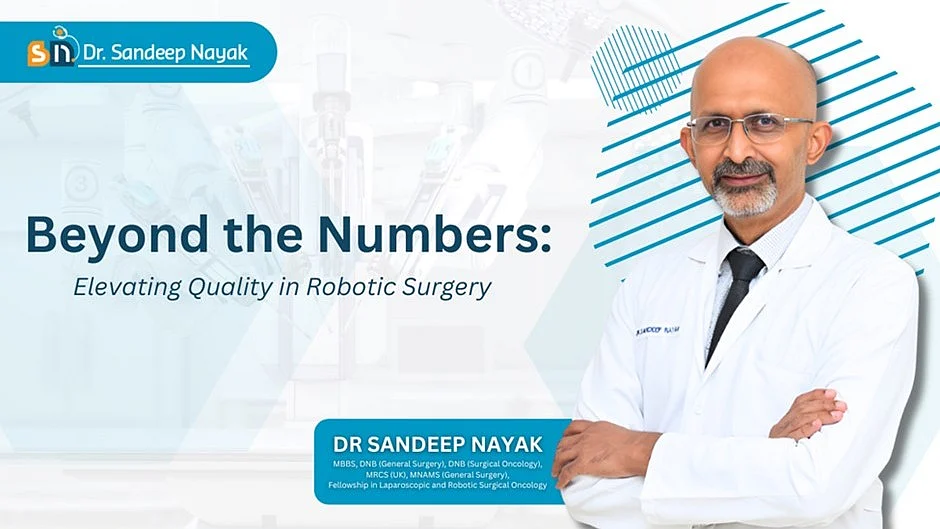Beyond the Numbers: Elevating Quality in Robotic Surgery
As with any groundbreaking innovation, the adoption of robotic surgery brings with it both promise and potential pitfalls

In the rapidly evolving landscape of modern medicine, robotic surgery stands as a shining example of technological advancement. These sophisticated systems offer surgeons unparalleled precision and control, making minimally invasive procedures more accessible and effective.
However, as with any groundbreaking innovation, the adoption of robotic surgery brings with it both promise and potential pitfalls. A concerning trend has emerged in the medical community: the sheer number of robotic surgeries performed is increasingly heralded as a primary marker of success.
While numbers play a critical role in understanding statistical outcomes in scientific research, they are not, by themselves, sufficient indicators of quality and efficacy. "In fact, they may even signify unindicated surgeries," cautions Dr. Sandeep Nayak, a leading surgical oncologist in India. "Crucially, this emphasis on numbers does not equate to meaningful research or scientific advancement."
Dr. Nayak believes that the true essence of the medical practice lies in the skill, precision, and patient-centered approach brought to each procedure. "The focus should be on the tangible benefits that each surgical intervention offers," he emphasizes. Robotic systems, for instance, are specifically designed to enhance the outcomes of minimally invasive surgeries by reducing recovery time and improving precision in complex procedures.
Yet, as Dr. Nayak points out, not every surgery necessitates such advanced technology. "Take orchiectomy, for example — a procedure to remove one or both testicles. It is typically performed without the need for robotic assistance, as it is straightforward and does not benefit from the minimally invasive approach that robotics offers."
A significant factor contributing to the overuse of robotic systems is the financial model surrounding these technologies. "Hospitals often calculate the return on investment (ROI) for their substantial expenditures on robotic systems," Dr. Nayak explains. "This calculation includes not only the initial purchase but also ongoing costs, as hospitals must pay the robotic company each time an instrument is used."
This creates a scenario where the excessive use of robotic systems primarily benefits the manufacturers, rather than the patients or healthcare providers who are at the heart of the medical process. The financial pressure to justify these investments can lead hospitals and some surgeons to prioritize the use of robotic systems, even in cases where they may not be the most appropriate choice for the patient.
This trend raises serious ethical concerns and can undermine the trust that patients place in their healthcare providers. "The drive to increase procedural numbers can lead to a dangerous trend of unindicated surgeries — procedures performed not out of medical necessity but to inflate success statistics," Dr. Nayak warns. "Such practices mislead patients and undermine the ethical foundation of healthcare. Regular audits are essential to ensure that each surgical intervention is genuinely warranted and beneficial."
Dr. Nayak insists that the efficacy of any surgical technology, robotic or otherwise, ultimately hinges on the expertise of its user. "For surgeons less adept at skill intense methods like laparoscopy, robotic systems may offer a valuable alternative for delivering minimally invasive surgeries," he notes. However, he stresses that the responsibility remains with the surgeon to choose the most appropriate approach for each patient, prioritizing their well-being above all else. "It's not just about having the latest technology—it's about knowing when and how to use it to truly benefit the patient."
With over 3,000 minimal access cancer surgeries and several innovative robotic surgical techniques to his credit, Dr. Nayak’s extensive experience underscores the importance of this balanced approach.
"Having witnessed firsthand the delicate balance between embracing new technologies and their judicious application, I am particularly concerned about the trend of marketing surgical prowess through inflated numbers," he shares. "This can mislead patients into believing they are receiving superior care based on quantity rather than quality. This approach risks turning every patient encounter into an opportunity to boost numbers, rather than addressing the unique medical needs of each individual."
Dr. Nayak further reflects on the broader implications of this trend. "The healthcare industry and surgeons must resist the trap of becoming like encounter specialists of the past, who, in their zeal to outdo each other, resorted to artificial measures of success," he advises. "In our field, this could translate to a relentless pursuit of numbers at the expense of patient care—a scenario we must fervently avoid."
He underscores the need for the medical community to remember that the ultimate measure of success in medicine should not be the sheer number of procedures performed but the quality of outcomes achieved for each patient. "By refocusing on delivering patient-centered care and ensuring every surgical intervention is both necessary and beneficial, we can truly harness the potential of robotic surgery to advance the field of medicine for the betterment of all."
Dr. Nayak’s insights offer a compelling reminder that while technology can enhance the practice of medicine, it should never overshadow the fundamental principles of patient care. The true success of robotic surgery, or any medical intervention, lies not in the numbers but in the positive impact on the lives of patients.
About Dr. Sandeep Nayak
Dr. Sandeep Nayak, one of India’s leading surgical oncologists, and the Founder and Chief of Surgical Oncology at MACS Clinic, Bangalore, is globally recognized for his expertise in minimally invasive cancer surgery.
Dedicated to providing ethical, evidence-based, and innovative treatment options, Dr. Nayak ensures the highest standard of dependable care. His unwavering passion for advancing cancer treatment continually improves patient outcomes and sets new benchmarks in oncology.
For further details, Contact Dr. Sandeep Nayak –
MACS Clinic,
42nd Cross Rd,
8th Block, Jayanagar,
Bengaluru, Karnataka - 560 070
Email: support@macsclinic.com
This is an advertorial. The published article is being presented as received.
Follow us on: Facebook, Twitter, Google News, Instagram
Join our official telegram channel (@nationalherald) and stay updated with the latest headlines